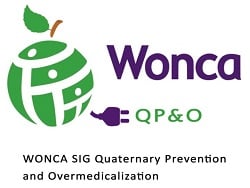
A new WONCA Special Interest Group on Quaternary Prevention and Overmedicalization was approved by the WONCA Council in October 2016. Membership is open to interested family doctors.
Introduction: Justification and Importance
“Medicine increasingly focuses on the problems that result from an excess of medical care, in particular overscreening and overdiagnosis. In a new framework or paradigm, based on patient doctor relationships, quaternary prevention (P4) describes the protection of patients from diagnostic tests, interventions and treatments that offer no benefit for overall morbidity or mortality for the individual, and may cause physical or psychological harm. It includes the protection of patients from misled well-meaning doctors and from a system in which the commercial interests of pharmaceutical and diagnostic companies, and governments working in a marketised model of health care, that can distort care, medicalize normal life and waste resources”. Jamoulle M, Mangin D (not published).
Definitions
The original definition of Quaternary Prevention was formulated in 1986:
Action taken to identify patient at risk of overmedicalization, to protect him from new medical invasion, and to suggest to him interventions, which are ethically acceptable.
The concept of quaternary prevention is grounded in the ethical principles of medicine, an epistemological understanding of a paradigm crisis or struggle that is challenging the predominant biological paradigm in health, and the realization of a movement that includes citizens, patients, care providers and public health policies.
Quaternary prevention provides a complex but necessary approach oriented to provide person -focused care; promote equity in healthcare; prevent overdiagnosis, unnecessary interventions, and avoid harm: and so, in few words, to humanize medicine. All the efforts within this global movement combine ethical sustainability with critical thinking, to oppose the vision of health as a commodity.
Understanding of the power of the socio-cultural determinants of health requires family and community medicine to re-think the approach to healthcare and to work in a huge network with all the relevant actors (persons/consumers, community stakeholders, providers, health managers, and politicians). Quaternary prevention applies primarily to the interpersonal level in the patient-doctor encounter. Confronting overdiagnosis and overuse are complementary issues with a different focus.
In the context of this broad approach it is clear that the tasks of quaternary prevention go beyond preventive activity and its conceptual scope can underpin all aspects of everyday medical activity in the face of uncertainty.
Overdiagnosis is understood to occur when an asymptomatic person is identified as having a disease, which would never harm them in their lifetime.